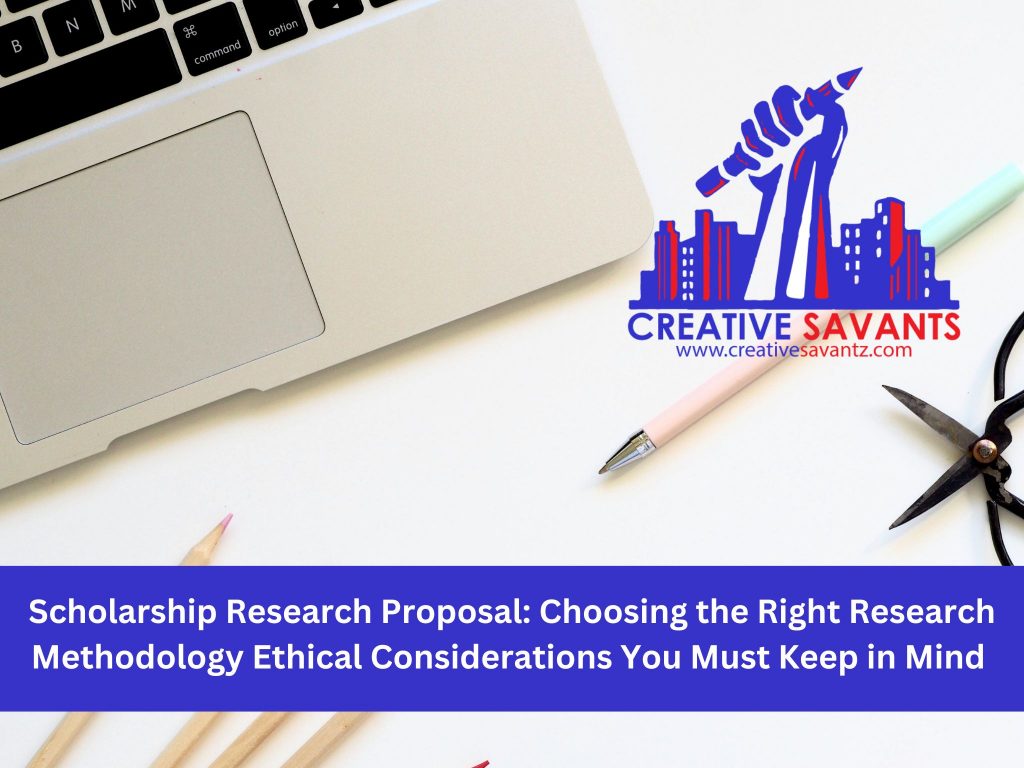The quality of your research proposal is key to getting funding for academic pursuits. Creating a good proposal involves navigating various elements, and the choice of research methodology holds paramount importance. This article guides you in selecting a suitable research method and emphasizes the ethical aspects you should consider.
Understanding The Basics
Differentiating between Primary and Secondary Research
Understanding the basic difference between primary and secondary research is crucial. Primary research involves collecting original data, while secondary research involves analyzing existing data. For scholarship research proposals, knowing when to use each method is important for designing a strong study framework.

Exploring the Role of Research Methodologies in Scholarship Research Proposal Applications
Scholarly investigations depend on research methodologies to form the foundation for collecting, analyzing, and interpreting data. These factors determine the reliability and validity of research findings. In the realm of scholarship applications, a well-constructed methodology enhances the credibility of your proposal and demonstrates your ability to conduct thorough and meaningful research.
Read more about: Top Ten International Scholarships for Students to look for in 2024
Highlighting the Importance of a Well-Crafted Research Proposal
A well-made research proposal is more than just a paper you need for scholarships. It shows how much you care about learning and making a difference in your field. Think of it like a map that guides you and the people checking your proposal through your study plan. When you pick a research method, make sure it fits well with what you want to do as explained in your proposal.
With Creative Savants, making a good scholarship research proposal is simple. Tell us your research ideas, and we’ll turn them into a strong proposal in a minimal fee. We mix creativity and accuracy to make your proposal stand out.
Your research proposal is like a key that unlocks opportunities for scholarships. It’s not just a formality; it shows that you’re serious about your study and want to contribute something important to your field. People who read your proposal want to see how well you’ve thought about your research, and that’s where Creative Savants can help.
We understand that crafting proposals can be challenging, and that’s where we step in. Our aim is to simplify the process for you. We take your valuable raw ideas and turn them into an outstanding proposal that goes beyond the ordinary. Our strength lies in making your proposals strong and unique without putting a strain on your finances – a clear sign of our commitment to affordability.
Types of Research Methodologies

Qualitative Research
Qualitative research is crucial for understanding complex phenomena and delving into the intricacies of human experiences, attitudes, and behaviors. Its power lies in providing detailed insights and generating hypotheses for further investigation. When creating your scholarship research proposal, consider using qualitative methods to uncover not just surface-level understanding but to unravel underlying motivations, perceptions, or cultural nuances related to your central question of interest.
Quantitative Research
In contrast, quantitative research involves systematically collecting and analyzing numerical data. This method is valuable for generalizing findings to a larger population or testing hypotheses with statistical rigor. If your scholarship research proposal involves measurable variables and requires statistical analyses, then a quantitative approach is likely the most suitable choice.
Mixed Methods
Mixed methods research combines both qualitative and quantitative methods smoothly to tackle complex research questions. This approach helps researchers look at the problem from different angles, giving a thorough understanding. If your scholarship proposal needs both detailed insights and broader numerical data, choosing this method is a smart move.

Choosing the Right Research Design
After exploring different research methods, the next key step is selecting the right research design. This decision plays a big role in shaping the structure of your study and ensuring the validity of your conclusions. Your research design is like a blueprint that guides the entire process, determining how you collect and analyze data.
A well-chosen design enhances the credibility of your study and showcases your understanding of the research landscape. Consider factors like time, budget, and expertise when making this decision, as they impact the practical aspects of data collection and analysis in your study.
Read More: How to Write Captivating Research Proposal
Mixing qualitative and quantitative research is like putting together puzzle pieces for a better understanding. Qualitative research explores feelings and experiences, while quantitative looks at patterns in a bigger group. When we use both methods, we get a complete picture that makes our findings stronger and more reliable.
This helps a lot in situations like figuring out complex questions, evaluating programs, exploring new topics, and understanding policies better. It’s like using the best of both worlds to get a clearer view.
Factors to Consider when Selecting a Scholarship Research Proposal Design
Alignment with Research Objectives
Make sure your scholarship research proposal’s objectives align smoothly with the chosen research design. If you want to deeply explore and understand a phenomenon, go for a qualitative design. If your goal is to establish causal relationships or generalize findings, opt for a suitable quantitative approach.
Learn more about: 9 Effective Tips to Study Smarter and Learn Faster
Feasibility and Resources
Consider your available resources—time, budget, and expertise. A well-designed research proposal should account for these practical aspects of data collection and analysis. For example, limited resources may lead to choosing a streamlined quantitative design over a more elaborate mixed methods approach.
Ethical Considerations in Scholarship Research Proposal Design Selection
Ethical considerations should guide your selection of a research design. Ensure that the chosen design respects participants’ rights and well-being. Also, think about potential impacts on vulnerable populations. Aim for consistent transparency in addressing ethical concerns throughout every phase of the scientific inquiry, without compromise.

Crafting Your Scholarship Research Proposal
With a solid understanding of various research methodologies and the factors influencing research design, let’s now explore the step-by-step guide to crafting a compelling scholarship research proposal.
Step-by-Step Guide to Writing a Scholarship Research Proposal
Introduction
Start with a brief introduction that explains the background, importance, and goals of your research. Clearly state the gap in current knowledge that your study aims to fill.
Read more: James Madison High School Help And Answers Online
Research Goals and Questions
Define the specific goals and questions of your research. This section sets the direction for your proposal and gives the reader a roadmap.
Literature Review
Review existing literature to place your research in the context of past studies. Show that you’re aware of relevant research, theories, and gaps in the current knowledge.
Research Methodology
Explain the chosen research method, clarifying why it’s the best for your goals. Whether qualitative, quantitative, or a mix, justify your choice and lay out a clear plan for collecting and analyzing data.
Read More: Difference Between Paraphrasing and Summarizing- 10 Tips to Avoid Plagiarism – January 2024
Significance and Contribution
Explain the wider importance of your research in your academic field. Clearly state how your study adds to existing knowledge and its potential impact on the field.
At Creative Savants, we simplify this process. Share your research ideas, and our experts will carefully craft your proposal for a reasonable fee. Let us turn your ideas into a compelling narrative that stands out in scholarship applications.
Ethical Considerations
Include a part about ethics, talking about things like getting permission, keeping things confidential, and making sure participants are okay. This shows you’re serious about doing research the right way.
Read More: Professional Business Writing Services
Timeline and Budget
Give a realistic schedule for each step of your research and lay out how much money you’ll need. This part adds a practical side to your proposal, showing you’re ready for the research process.
When you make choices and take actions in your research, keep in mind what’s fair and right. Thinking about ethics not only protects the participant’s you’re studying but also makes your scholarship proposal strong and reliable. It’s like building a foundation of trust for your research journey.

Addressing Ethical Concerns in Scholarship Research Proposals
Informed Consent
Ensure participants fully understand your study. Whether written or spoken, provide clear, detailed information. This transparency allows them to make an informed decision about participating.
Confidentiality and Privacy
Guard participants’ info like a secret. Explain exactly how you’ll keep their details safe, making sure no one can figure out who they are. Promise them their privacy is a big deal from start to finish.
Read more about: How to Paraphrase Research Work for Your Dissertation: Tips To Avoid Plagiarism – January 2024
Transparency in Reporting Results
Don’t hide anything. Share all your findings honestly. If you run into challenges, talk about them. Paint a full and truthful picture of your study.
Avoiding Biases and Conflicts of Interest
Think about any biases you might have and don’t hide them. Be extra careful about any conflicts that could mess with your study’s fairness. If you have any connections that could sway your research, spill the beans.
By being on top of these ethical things, you’re showing everyone you’re committed to doing research the right way. Following these standards is something scholarship committees really appreciate when they check out research proposals.

Importance of Scholarship Research Proposal for Scholarships
After exploring research methods and ethical considerations, let’s understand why a strong research proposal is vital for your scholarship application.
Impact on Selection
Scholarship committees use proposals to evaluate your study’s quality, feasibility, and importance. A well-crafted proposal sets your application apart, showing your ability to define your goals and succeed.
Learn more: Turnitin AI Detection Tool: A New Addition to its Already Popular Academic Integrity Solutions- January 2024
Commitment to Ethics
Ethical considerations aren’t just a checkbox; they show you’re serious about responsible research. Emphasizing your awareness and proactive approach boosts your credibility as a researcher and a scholarship candidate.
Building Credibility and Rigor
A good proposal reflects your dedication to academic rigor. It shows you grasp research methods, ethics, and your study’s broader context. This boosts your research’s credibility and positions you as a serious and capable scholar.
Diversity and Inclusivity in Participant Selection
Choose your participants thoughtfully, acknowledging and valuing diversity. Clearly explain how you plan to include individuals from various backgrounds, emphasizing the importance of diversity in making your findings robust and applicable. Discuss your strategies for engaging participants from different groups, fostering inclusivity, and creating a research environment that respects and values diversity.
Read more: A User-Friendly Guide for Students to Check for Plagiarism on the Turnitin Interface- January 2024
Community Engagement and Collaborative Research
Engage with the community throughout the research process, building collaborative relationships and integrating community perspectives. Ensure ongoing dialogue, feedback, and collaboration. Demonstrate your commitment to ethical conduct beyond individual participation by considering the welfare of the community as a whole.
Power Dynamics and Empowerment of Participants
Address power imbalances, especially with vulnerable populations. Minimize potential exploitation and empower participants throughout the research journey. Clearly explain your strategies for obtaining informed consent in a manner that is clear, transparent, and empowers participants in decision-making. Mitigate imbalances of power, fostering a relationship built on respect and ethical responsibility.

Ethical Data Management and Confidentiality
Clearly outline measures to protect data confidentiality, emphasizing the importance of data security to prevent breaches. Commit to maintaining participant privacy throughout the research process. Implement measures such as anonymization or de-identification of data to protect participant identities.
Continuous Ethical Reflection and Adaptation
Commit to ongoing ethical reflection throughout the research process, acknowledging the dynamic nature of ethical considerations. Pledge to evaluate and adjust your ethical framework as needed. Showcase dedication to ethical conduct and responsible navigation of ethical challenges. Discuss how you will incorporate feedback, address emerging ethical issues, and ensure that ethical considerations evolve in tandem with the progression of your research.
Choose a research partner committed to ethical integrity. Creative Savants guides you through ongoing ethical reflection, ensuring your research’s ethical framework remains resilient and adaptable.
Learn More:A User-Friendly Guide for Students to Check for Plagiarism on the Turnitin Interface- November 2024
Emphasizing the Crucial Role of Ethical Considerations
In scholarship proposal research applications, being ethical in your research is like weaving an important thread. It’s not just about having smart ideas but showing that you’re a good and responsible researcher. Committees look for people who are honest, responsible, and want to help society through knowledge.
When you create your scholarship research proposal, its like telling a story about who you are. It shows what you believe in, how much you care about learning, and how you can make a real difference.
Learn about: A User-Friendly Guide for Students to Check for Plagiarism on the Turnitin Interface- January 2024
With Creative Savants, we help make your research proposal special by combining ethical thinking with creative excellence. We’re not just about giving you a proposal; we’re here to make your research stand out. We think about everything, from including different voices to making sure your research is done in the right way.
In the world of scholarship applications, your research proposal isn’t just a paper; it’s like a mirror showing who you are as a smart and good person. Treat it with care, be curious, and respect the rules of good research. This way, you not only improve your chances of getting money for your research but also help everyone learn more. Good luck on your research journey!

